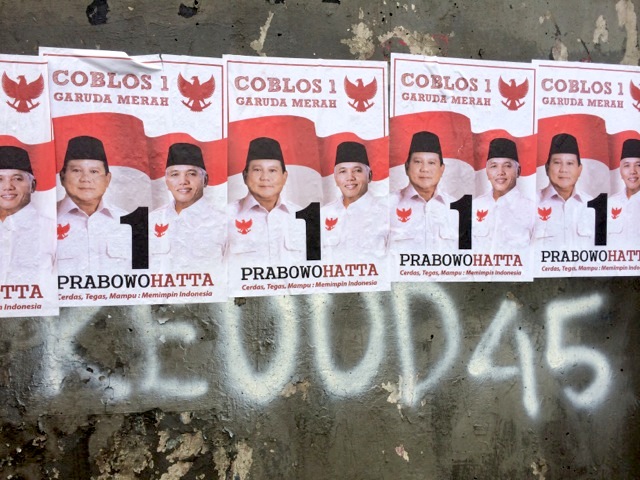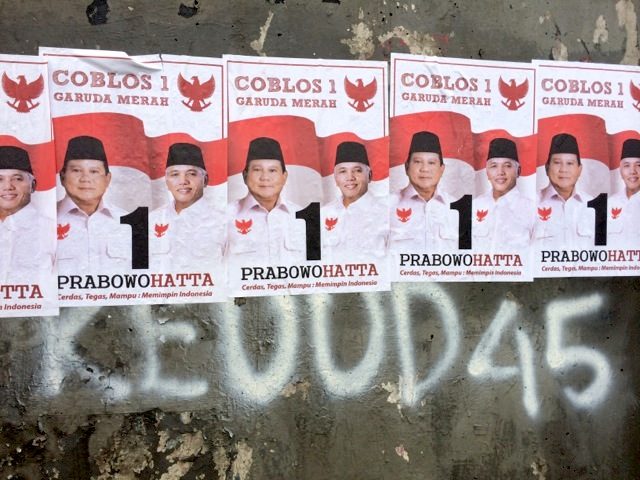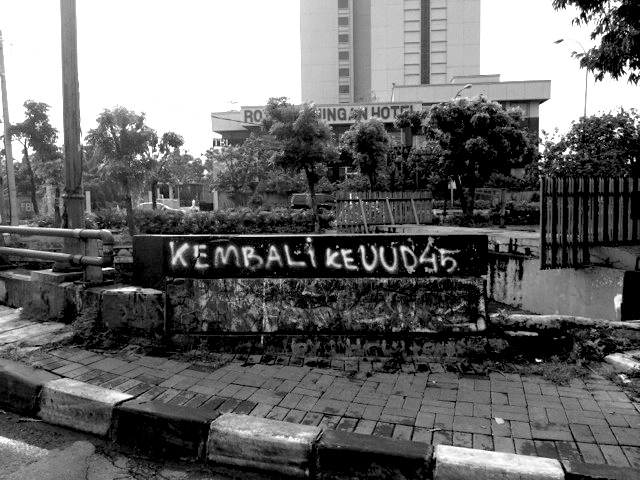
A slogan calling for a return to the 1945 constitution, underneath Prabowo-Hatta stickers in Jakarta. (Photo: Jacqui Baker)
In late May 2014, Prabowo Subianto and Hatta Rajasa formally registered with the General Electoral Commission as presidential and vice presidential candidates. As part of this process, they were required to submit their ‘mission statements’. One of these was to ‘consistently implement Pancasila and the 1945 Constitution’. This reflects statements made in the political manifesto of GERINDRA, in which the party pledges to ‘uphold Pancasila and the 1945 Constitution’, with ‘purity of implementation’ (kemurnian pelaksanaan). Prabowo has made public statements to similar effect.
On its face, this might seem like a relatively uncontroversial pledge. After all, governments are supposed to follow constitutions. But if one scratches the surface, it seems that GERINDRA does not merely seek to ensure that government and citizens follow the current constitution, which is called the ‘1945 Constitution’. It appears that the party wishes for Indonesia to be governed by the original text (naskah asli) of 1945 Constitution, stipulated on 18 August 1945, one day after Indonesia declared its independence.
This is clear from GERINDRA’s manifesto, much of which reads like a New Order playbook. The manifesto refers to the need to ‘correct’ liberal democratic aspects of the political system which do not fit the character of the Indonesian nation and have caused national legal and political instability counter-productive to Indonesia’s ‘development’ (pembangunan). It also emphasises the importance of a having a strong leader with a ‘responsible ideology’ who will ensure the ‘existence of Pancasila, the mandate and sacred aspiration of the nation, declared in the Proclamation of Independence on 17 August 1945’. The manifesto refers to the application of a ‘pure presidential system’ and the need to ‘repair’ institutions, bodies or commissions that have been created but ‘do not accord’ with the 1945 Constitution.
These types of statements strongly recall those Soeharto made when taking over power from Soekarno, including that Soekarno had implemented both the 1945 Constitution and Pancasila with ‘deviations’. Soeharto then pledged to ‘purely’ implement them. Although the manifesto is broadly supportive of human rights and even says that citizens should be able to enforce them against the state, it also criticises the universalism of human rights, stressing that those rights must ‘consider’ national culture and interests, and claiming that foreign countries have used human rights issues to dictate to Indonesia and to interfere in Indonesia’s domestic affairs. This is a critical statement because Indonesia’s Bill of Rights is drawn from the very international human rights instruments, which the manifesto appears to denounce. In this context it is perhaps unsurprising that the manifesto condemns Indonesia’s Human Rights courts as ‘excessive’.
So what would a return to the original text of the 1945 Constitution mean? In essence, it would require the ‘undoing’ of the amendments made to the Constitution in 1999-2002. Provisions upon which Indonesian democracy is now constitutionally constructed would be removed. These include the extensive chapter on human rights and the constitutional bases for free and fair democratic elections, an empowered legislature, and stronger regional government. It would also result in the constitutional excision of institutions that have become features of Indonesian political life, such as the Constitutional Court and the Judicial Commission. Some of these institutions have played important accountability functions in post-Soeharto Indonesia. Critically, stronger presidential powers would presumably be reinstated and, presumably, the prohibition on presidents serving more than two terms would be removed. In other words, the constitutional door would likely be left ajar for another long dictatorship. Indonesia would be left with a constitution only ever intended to be temporary – or ‘kilat’ as Soekarno famously described it – and fashioned for very different circumstances to those Indonesia faces today.
However, a significant question remains. If elected, would Prabowo be able to use his presidential powers to revert to the naskah asli and to meet other objectives in the GERINDRA manifesto? By legal means, this is likely to be difficult precisely because many of the post-Soeharto constitutional amendments were geared towards preventing a reversion to authoritarianism, which had flourished under the naskah asli version from 1959-1998. The Constitution would need to be amended, but Prabowo would have no legal power to do this unilaterally. To amend the Constitution, he would require a meeting of the MPR, at least two thirds of MPR members to attend that meeting, and then at least 50% of attending members to vote in favour of the changes. He is unlikely to able to rely on the support of the parties – even those that nominated him for the presidency – to support him in this endeavour because, presumably, a return to the naskah asli would necessarily involve a reduction of legislative power, probably a reconfiguration of the party system itself. The parties have more to gain from the constitutional status quo, which supports a strong parliamentary system in which the formal powers of the president are limited.
Likewise, it is unlikely that Prabowo could use presidential ‘emergency’ powers under the Constitution to return to the naskah asli. Article 22 of the Constitution gives the President power to issue interim emergency laws that can override statutes of the national parliament. To be sure, these powers are broad and strong – the President has absolute discretion to issue these laws in the face of a situation he or she deems to be an emergency – but the President cannot use them to amend the Constitution. Such laws must also be agreed to by the national parliament at its next sitting to remain in force. Again, it is unlikely that the parties would approve laws that undermine their own interests. Finally, Article 12 of the Constitution gives the President power to ‘declare an emergency’ – a power which Soekarno himself had used in 1959 to decree the return to the 1945 Constitution. It was also the power Abdurahman Wahid is thought to have attempted to use in 2001 to order the army to dissolve the DPR and MPR. The 1959 statue that governs states of emergency gives only limited powers to the president – and certainly does allow for the presidential dissolution of parliament, let alone constitutional amendment or replacement.)
The conclusion here is clear: If the Prabowo-Hatta pair cannot garner parliamentary support to roll back the post-Soeharto constitutional reforms, then they will need to resort to unconstitutional or otherwise illegal means to meet their stated ‘mission’. This does not bode well for the future of the rule of law and democracy in Indonesia.
……………
Simon Butt is an ARC Australian Postdoctoral Research Fellow and Associate Director of the Centre for Asian and Pacific Law at the University of Sydney.
 Facebook
Facebook  Twitter
Twitter  Soundcloud
Soundcloud  Youtube
Youtube  Rss
Rss 
